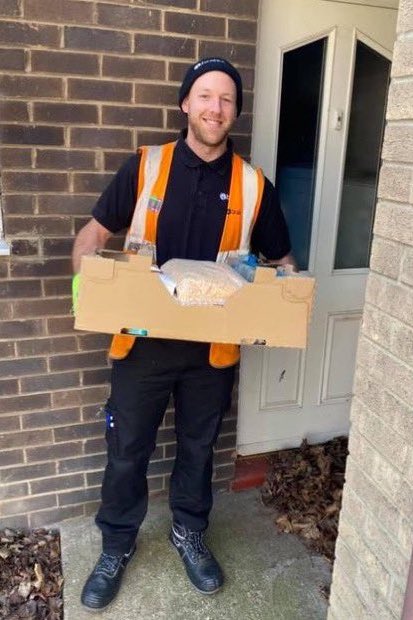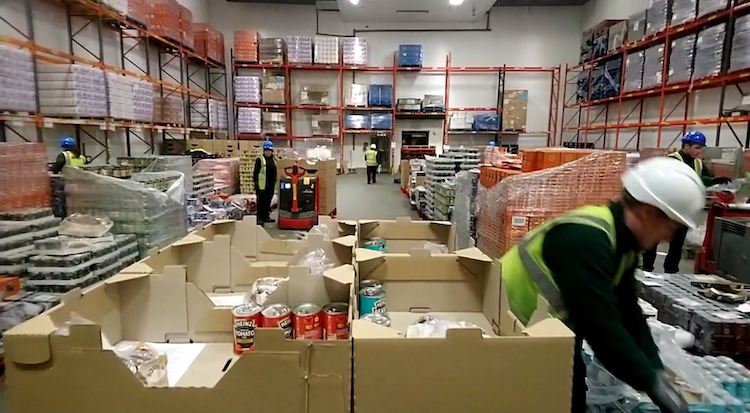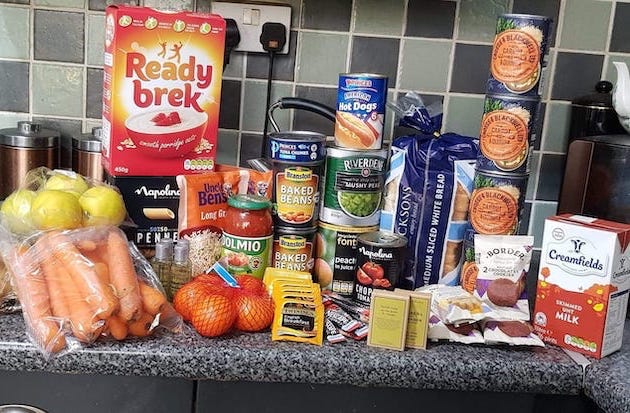
When the pandemic struck, Ruby Dixon was deployed to develop and spearhead Britain’s national shielding programme to support 2.6m vulnerable people, and ensure that food and grants reached the needy.
I joined the Ministry for Housing, Communities, and Local Government (MHCLG) from the local government sector, and one word that unites both sectors is prolific use of the (other) C-word – ‘Communities.’

Nowhere has this been more evident than in the work carried out by my Local Government and Communities Directorate since February to support local people and places through the pandemic.
The Heineken Effect
Right from the start of the pandemic, the local situation with personal protective equipment (PPE) posed a huge challenge for the Civil Service both in terms of size and scale.
The Ministry for Housing, Communities and Local Government PPE cell worked across government and alongside military personnel sourcing emergency supplies of masks, gloves and aprons for local communities across England.
In February, the Department for Health and Social Care (DHSC) experienced unprecedented issues.
My Directorate, Local Government and Communities, worked hard to set up a distribution system with MHCLG taking on responsibility for supplying PPE where it was most needed.
Emergency drops
This was achieved by making emergency drops to Local Resilience Forums (LRFs). These are made up of police, emergency services and local authorities who fast-tracked supplies to the frontline. This quickly became a core part of the PPE Central-Local Government working together to get the supplies to where they were needed in real-time.
This really was MHCLG at its best – stepping up in a crisis to deliver for local communities. As the pandemic progressed, collaboration across Whitehall, the NHS, military, LRFs, and councils, meant PPE reached parts of the country, other activities couldn’t reach, which helped stabilise supplies and distribution.
Shielding 2.6million people
Fast forward a fortnight to mid-March, I was redeployed from my role as Local Government Efficiency policy lead, to a tiny, tight-knit and adventurous team to set up the National Shielding Programme. This would support 2.6m clinically vulnerable people advised to stay at home for 12 weeks.
Within an hour of joining the team, I was leading the historic data-sharing agreement that enabled the health sector to share personal health data under the NHS and Covid19 Acts with Councils for the first time.

My exciting role required me to work across Whitehall to design and implement digital and phone systems for customers within 48 hours, so that people on the clinically extremely vulnerable list (with underlying conditions) could register their food, support and basic care needs both nationally and locally.
Simultaneously, we worked with DEFRA, the food industry and supermarkets to ensure those shielding had access to food and essential supplies.
Major milestone
We hit a major milestone when our Secretary of State Robert Jenrick delivered the millionth food box, and by July, this increased to more than 4.5 million boxes.
Of course, not everyone wanted a box, and for those with special dietary needs, councils, food banks, charities, and small businesses formed part of the safety blanket to help for the clinically vulnerable.
Helping those in hardship
We also worked with other departments to help councils’ provide hardship grants and support for food and essential supplies to those not on the Shielding list.
In particular, MHCLG supported DEFRA to launch a £63 million Local Authority Emergency Assistance Grant and then DWP with the £170 million Winter Grants Scheme – both at pace.

You've got to have faith
Underpinning our work were our links with faith leaders in clarity, comfort and hope for communities. For instance, working with Public Health England, MHCLG helped to ensure faith leaders and bereaved families could conduct burials safely during the pandemic.
It pays to be compliant
Local Isolation Payments encouraged and supported people on low incomes or benefits to self-isolate if they displayed virus symptoms or had been contact with someone who has.
During the roll-out phase, MHCLG enabled joint working between local government and the Department of Health and Social Care, supporting the design and delivery of the self-isolation payments scheme. It also distributed funding for councils, enabling them to make discretionary payments to individuals.
Ray of hope
Amid the suffering, there is finally a real ray of hope with three vaccines for Covid19.
MHCLG has already mobilised and is working with the NHS to ensure effective distribution so that councils and communities get swift access to the vaccine for their most vulnerable.
We recently launched and co-chair the new National Vaccine Deployment Steering Group with the Department of Health and Social Care and NHS, focusing on challenges around logistics, national communications (especially for hard-to-reach communities), and local funding and capacity issues.
People, Place, Pace
Throughout the pandemic, communities and places have remained our focus.
Elsewhere across MHCLG, the Homelessness and Rough Sleeping team supported an incredible 5,400 rough sleepers to offer safe accommodation, as well as a unique opportunity to turn their lives around.
Meanwhile our Local Government Finance Directorate worked tirelessly across Whitehall and the Local Government sector to secure £10 billion funding to date, for councils to alleviate COVID19 pressures, higher demand for adult social care, the Infection Control Fund, local Test and Trace, and income support.
Working with national and local partners
It’s fair to say the scale of the challenge has been enormous, but as a department we’ve set up engagement infrastructure to allow us to work with national and local partners at pace.
We use real-time data to drive on-the-spot problem solving, agile decisions, taking and effective action. All whilst maximising the talent, teams, and training that make our civil service world-leading.
Opportunity
After COVID19, we’ll be working to help local communities both survive and thrive, to come back stronger and to offer everyone the same opportunity to get ahead in life.
Our key lesson is that the golden thread in the Government’s safety net for our most vulnerable citizens is Civil Service collaboration of people and place, at pace.

16 comments
Comment by Sean Davin posted on
The marvellous Ruby Dixon -one of our own and a real marvel -energy, fizz ,passion and heart and a Gooner too. Keep paying it forward Ruby and thanks for sharing and thanks to all that leaned in to support the most vulnerable . Its this , often unseen, work that makes me proud to work in MHCLG and the Civil Service.
Comment by Ruby posted on
Thanks Julie, Barnsley's is also excellent - they were able to capture every contact and local outcome from every contact with people who were shielding locally - including those Government couldn't get a response from.
Comment by Nick posted on
Thanks for this great blog Ruby, so impressive to take in the breadth of work that the department has done in partnership with others over the last year - it's a long list!
Comment by Julie Stephenson posted on
Really great blog Ruby. I attended the session you arranged with Bradford council to see their contact system which was brilliant. It showed how you and the team had really connected with councils to reach all citizens in need.
Comment by Ruby posted on
Yes, Steve - I think working on Shielding was very fulfilling. We worked such long hours without a day off, adapting to constant challenges but we were always focused on communities and people in need and it drove us to do more. It was amazing working with you, and swapping our own personal soundtrack for the day - if only we had had time to listen to them!
Comment by Steve N posted on
Brilliant blog Ruby, and brings it all back to those early days in Shielding. A really good case of how civil servants can adapt and change to any challenge, and how well we (you) worked across teams, departments and sectors. Keep on rockin' Ruby......
Comment by Daisy Yates posted on
Ruby - so good to see set out all the incredible work you and MHCLG colleagues have been doing on covid response. You are such a great person to have in our department.
Comment by Ruby posted on
Thanks Daisy but this would not have been possible without the engagement and comms mechanisms you set up with local government so councils could show local stewardship!
Comment by Gavin Thomas posted on
Thank you Ruby for sharing with us this inspiring story.
For me, one of the positive outcomes from the pandemic has been the kindness and respect that people have shown to others.
This is a great example of how a simple act of kindness can be such a significant life changing moment for others.
Keep Safe!
Comment by ruby posted on
Yes Gavin, I agree. The sense of community and the way neighbourhoods have pulled together has been humbling. Andy Haldane the Chief Economist for the Bank of England has commented very publicly the same sentiments as you writing with authority on the social resilience and solidarity that arose from such community spirit. As we come out of the pandemic he says it is crucial to the resilience of not just of communities and localities but to the state. He says that civil society always steps up to fill cracks at time of emergency and is the social glue that unifies us all in crisis. The small acts of kindness be they a smile, a check in on a neighbour, or the the local caf that has closed to customers but uses its stocks to make fresh daily sandwiches for children living in hardship - cannot be undervalued. We have high infection rates and a lot of people shielding and self isolating so those small acts of kindness like a call giving people social contact are needed more than ever.
Comment by Clare Bridges posted on
I was thinking of you recently Ruby. So good to hear you have been involved in such inspiring work and really making a difference.
Comment by Ruby posted on
Clare, good to hear from you! It was very inspiring and purposeful work, and for those of us who worked on Shielding, we're humbled that SAGE and Ministers have said it has been one of the most important post-war time national interventions. But there's still a lot to do to get on top of the pandemic, so stay safe.
Comment by Rustem Aziz posted on
Great piece Ruby, well done. We have achieved so much and worked so well together with local and national government to help keep people safe.
Comment by Ruby posted on
Russ, this work only captures a tiny bit of what you and colleagues achieved with PPE, and thanks for your contribution to this blog!
Comment by Karen posted on
What incredible work in unprecedented times, it shows the impact of working together
Comment by Ruby posted on
Thanks Karen, I hoped this overview of some of MHCLG's work has given a human face to what we do - we are definitely more than the sum of our parts, and it is incredibly satisfying to see the meaningful impacts of the work.